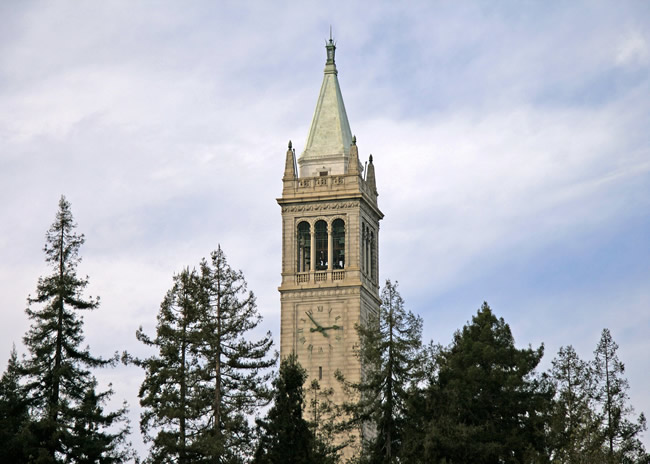« Ricoh announces RICOH GR IIIx, a High-End, Compact Digital Camera. | Main | Pecco Bagnaia secures Extraordinary Maiden Victory in Aragón MotoGP. Jack Miller gets the fifth place. »
September 10, 2021
Center for Security in Politics at UC Berkeley Goldman School of Public Policy announces New Working Group to study Digital Remote Voting
• The new group will consist of experienced election security and cybersecurity experts, election administrators, and engineers to explore new voting methods that expand the ease and accessibility of voting.
• The goal is to engage in an academically rigorous process to evaluate and develop a set of security, accessibility, and election administration standards necessary for vendors and election officials to implement safe and secure digital ballot return options.

Photo: Clock Tower, University of California, Berkeley. Image Credit: Keegan Houser.

Photo: 2020 U.S. Presidential. Countdown to November 2020 Election. Image Credit: GPA Photo Archive / Carol M. Highsmith / Library of Congress. Public Domain. File Photo.
BERKELEY, Calif., September 10, 2021 — Center for Security in Politics (CSP) at the UC Berkeley Goldman School of Public Policy has announced the formation of a new working group to rigorously assess the risks and opportunities associated with digital remote voting. The group will determine the feasibility of technical and implementation standards to enable digital ballots’ safe and secure return. Further, it would develop those standards and, where possible, outline the technologies necessary to meet the criteria.
As part of CSP’s mission to address critical global risks and public policy problems and create actionable solutions for policymakers, the working group will evaluate new methods to make voting more accessible, resilient, and secure for all Americans.
The group will consist of academic researchers, election administrators, cryptographers, and cybersecurity and election security experts. The first meeting took place on August 31, 2021.
“How people think about - and participate - in voting is changing,” said Professor Janet Napolitano, founder and faculty director for the Center for Security in Politics at UC Berkeley. “We cannot turn a blind eye to the lessons of the 2020 election or overlook the voters who face inherent barriers to voting. Instead, we need academically rigorous, evidence-based standards that will guide the development of safe and secure remote balloting technology.”
Recent advances in technology present a historic opportunity to explore new voting methods that could expand the ease and accessibility of voting. The 2020 presidential election cycle made it clear that voters need multiple options to cast their ballots, especially those displaced during a natural disaster, serving in the military, or unable to mark their ballot independently. Remote digital voting could address these barriers and expand access to new voters.
Digital remote voting comes with its own set of challenges, including voter and device authentication and vote verification. The group will study best practices from other countries and analyze the risks, rewards, and trade-offs. Digital remote voting is already available to military and overseas voters in 31 states and disabled voters in 8 states. Still, there are currently no national standards for security and to protect the anonymity of voters’ ballots. Over 330 jurisdictions in 8 states used mobile voting in 2020 during the November federal election.
“The last few years have publicly highlighted what election officials have long known: there are risks in administering elections,” said group convener Mike Garcia. He is a cybersecurity expert who previously ran digital identity at the National Institute of Standards and Technology and has been working with states and localities on election security since 2017.
“There’s been a lot of noise around technologies relating to digital remote voting, both from vendors wanting to sell such technologies and from cybersecurity experts who almost universally oppose them,” says Jeremy Epstein, an expert in voting security. “Very little of the debates have been understandable to policymakers. Having a report from a balanced group of experts can help inform the discussion and give guidance to election officials who are frequently caught in the middle, unsure of the ‘least dangerous’ path forward.”
“There is no one approach to voting that works for everyone in the country,” said Garcia. “Moreover, no individual should forfeit their right to vote because the authorities suddenly call them to fight a wildfire or serve overseas on Election Day. Officials’ experience enables them to manage risk with mail-in ballots and in-person voting successfully. Still, the relative newness and technical nature of digital ballot return demand a focused effort. Digital remote voting is already happening. Now is the time to properly scan its use and provide unbiased guidance on managing risk to ensure it is secure, resilient, and accessible.”
Source: Center for Security in Politics, UC Berkeley Goldman School of Public Policy.
|GlobalGiants.Com|
— The editor holds a certificate in ‘Solving Public Policy Problems’ from UC Berkeley Goldman School of Public Policy.







Edited & Posted by the Editor | 6:28 AM | Link to this Post







